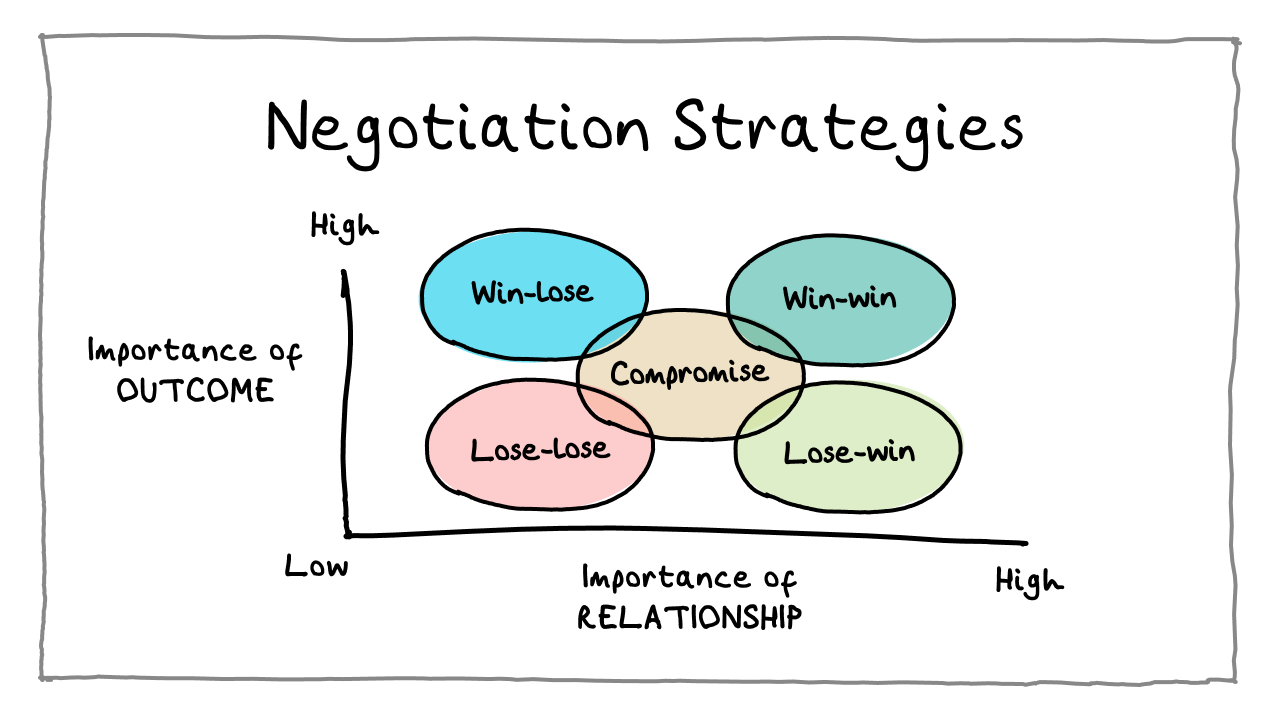Curriculum
Sales Negotiation Mastery For Salespeople
Sales Negotiation Mastery
0/15-
Sales Negotiation Course Intro
-
Lesson 1 – Having a Negotiation Position
-
Lesson 2 – Negotiation Behaviors
-
Lesson 3 – Perceptions in Negotiations
-
Lesson 4 – Communication in Sales Negotiations
-
Lesson 5 – Focus on INTERESTS, Not Positions
-
Lesson 6 – Creating Options
-
Lesson 7 – The Use of Objective Criteria
-
Lesson 8 – Develop Your BATNA
-
Lesson 9 – Building the Relationship
-
Lesson 10 – Making the Offer
-
Lesson 11 – Overcoming Objections
-
Lesson 12 – Virtual Sales Negotiations
-
Lesson 13 – The Sales negotiation checklist
-
Lesson 14, Closing the Deal Inspiration
Sales Negotiation Course Intro
Sales Negotiation Training
“Your price is too high.” “Can you match the price your competitor is offering?” “We need to have that service included in your price.”
In sales negotiation, how do you respond when you hear these kinds of statements from customers? Everyone wants to make the sale in this challenging economy, and it’s hard to resist the temptation to cut the margin, reduce the price, or give away “value adds” the customer really should pay for. Of course, everyone is being squeezed. Customers are pressured to control costs and limit spending, and salespeople feel they are forced to compete on price.
It seems better to get something rather than nothing. The assumption is that if the customer takes a hard position, the options for bargaining are limited. The most likely outcome is that the salesperson gives up margin and profitability rather than negotiating effectively for a win-win agreement that benefits both parties.
By following the steps outlined in this sales training course on negotiation, you can engage your customers in a give-and-take conversation to explore the interests behind positions and expand the options. This means moving out of the mentality of “hard bargaining” based on firm positions and into a mode of negotiating based on a handful of powerful principles. By applying these principles, you will increase the likelihood of achieving win-win sales negotiation agreements that benefit both you, the salesperson (who is no longer leaving business on the table), and customers, who have more options for better solutions.

The Psychology of Sales Negotiation
Sales negotiation is the communication between two or more individuals or groups who meet with the intent of producing a cooperative agreement. Each group may have conflicting interests or priorities and must shift position or change the threshold of acceptance to reach a mutually beneficial agreement. The single most important objective of an honestly negotiated agreement is to ensure each party feels they have won relative to their priority negotiation interest objectives.
Achievement of this objective requires that some basic psychological constraints and guidelines are followed during the process. These constraints and guidelines assume that the fundamentals of negotiation are in place – i.e., honesty, willingness, shared and conflicting interests, room to maneuver, and authority to maneuver.
Top Negotiation Mistakes:
1. Lack of Trust
2. Value proposition is not understood
3. “Giving” without “Getting”
4. Inability to check your emotions at the door
5. Focus on Position vs Outcome
6. Lack of preparation
Sample:
Lesson 5: Focus on INTERESTS, Not Positions
The basic problem in a sales negotiation lies not in conflicting positions but in the conflict between each side’s needs, desires, concerns, and fears.
Interests motivate people; they are the silent movers behind the hubbub of positions.
Your negotiation position is something you have decided upon
Your interests are what caused you to decide.
Focusing on interests rather than positions works for two reasons. First, for every customer’s interest, there usually exist several viable solutions that could satisfy them. We tend to assume that because the customers’ position is opposed to ours, their interests must also be opposed. If we have an interest in selling to them, then they must want to avoid us. If we have an interest in maximizing the price, then their interest must be to minimize it. In many sales negotiations, however, a close examination of the underlying interests will reveal the existence of many more interests that are shared or compatible than ones that are opposed.

How do you identify interests?
How do you go about understanding the interests involved in a sales negotiation, remembering that figuring out their interests will be at least as important as figuring out yours?
Ask why?
One basic technique is to put yourself in their shoes.
Examine each position they take and ask yourself, “Why?”
Why, for instance, does your customer prefer to fix the price year by year?
The answer you may produce to be protected against increasing costs is one of his interests.
You can also ask the customer why they take a particular position.
If you do, make clear that you are asking not for justification of this position but for an understanding of the needs, hopes, fears, or desires that it serves.
“What’s your basic concern, Mr. Jones, in wanting our deal to run for no more than one year?”

In reality, savvy sales negotiators understand the need to separate the people from the problem. They are sure to be soft on the people but rigorous regarding the problem. They focus on interests, not positions, and are always exploring mutual interests. A good negotiator will focus on outcomes, NOT positions. Doing so will create unique solutions and expand the scope of the agreement, which increases the probability of achieving agreement. A poor negotiator will approach the sales negotiation fixated on their position and will tend to be less flexible. They dig their heels in and become focused on maintaining a position versus creatively solving the problem. This results in a scarcity mentality versus an abundance mentality and causes both parties to choose sides and draw proverbial lines in the sand.